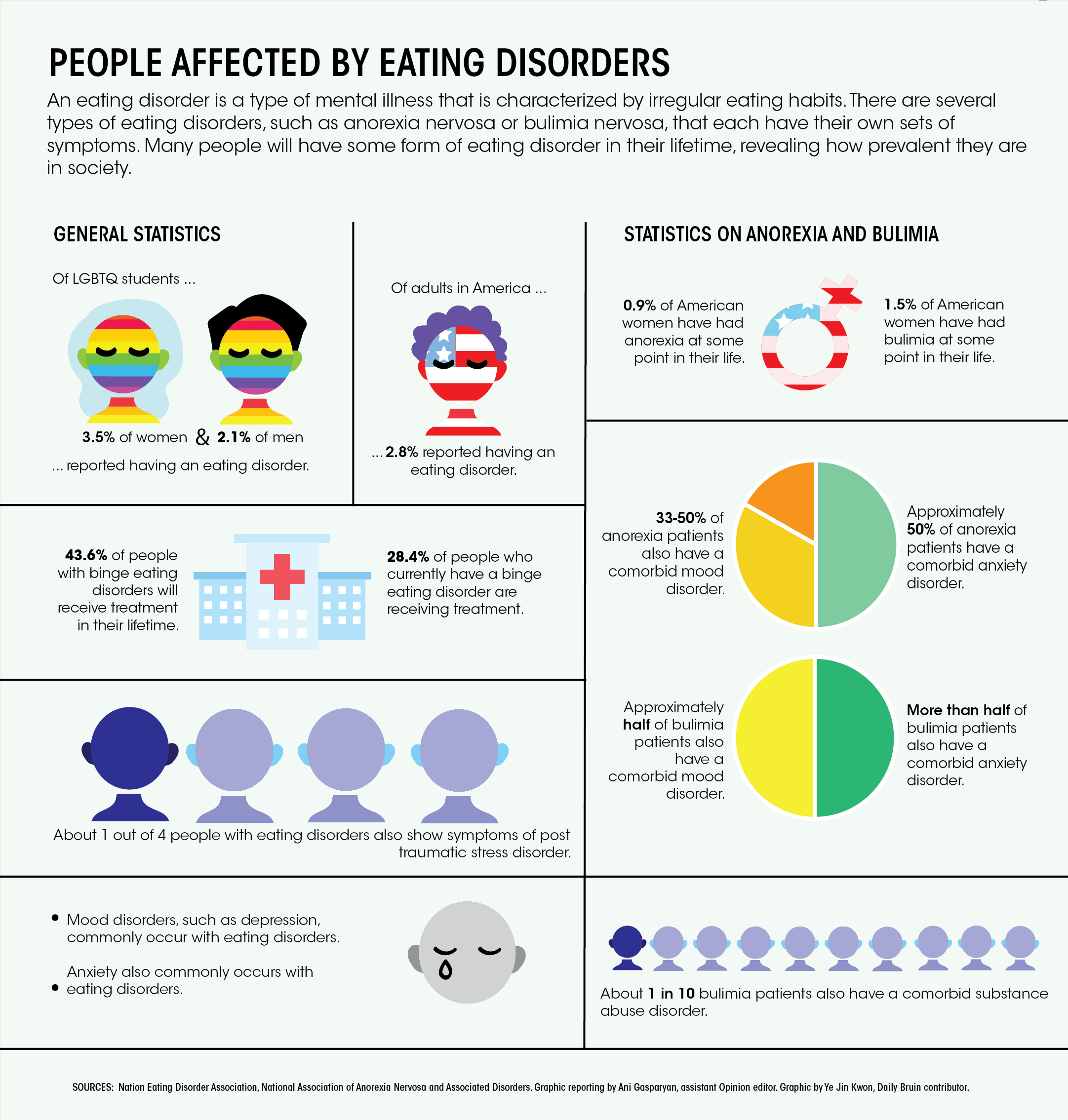CAE must clarify guidelines to accommodate students with eating disorders

By Tabatha Lewis-Simó
Nov. 9, 2018 12:19 a.m.
It’s 10 p.m., Thursday night, and your assignment is due in two hours. But those two pieces of sourdough bread you ate with dinner haunt your thoughts. After you had one piece, you couldn’t stop yourself from having a second. If you squeeze in a nine-mile run now, you will only have 30 minutes to complete the project.
This pattern of thought may be consistent with that of people with an eating disorder. Eating disorders are mental illnesses characterized by disturbances in eating habits. Two of the most common eating disorders are bulimia and anorexia nervosa. Bulimia nervosa is characterized by consumption of large quantities of food at once, followed by purging – intentionally throwing up, exercising excessively or using laxatives unnecessarily, for example. Anorexia nervosa is characterized by attempts to prevent weight gain through methods such as starvation.
These disorders can take mental and physical tolls on students. An eating disorder can impair a student’s ability to perform in school because it can take up their time and be physically impairing.
Bruins seeking accommodations for a disability must go through the Center for Accessible Education and see a counselor of the Disability Service office, provided they have documentation from a medical specialist. Counselors hear students’ cases, and, if they believe it necessary, work out accommodations on a case-by-case basis.
However, UCLA has no explicit guidelines for what accommodations students with mental illnesses, including eating disorders, would receive. This means it can be difficult for someone with an eating disorder to receive any accommodations.
The university needs to address this oversight and formalize a process for helping students with eating disorders receive the support they need. Without a protocol for accommodating these students, professors have no obligation to grant them exceptions to coursework or exam logistics – further stigmatizing and alienating a very present population on this campus.
Eating disorders can be difficult for students taking classes in which majority of their course grades are often based on two midterms and a final, for example. Many professors create syllabuses stating there are no exceptions or opportunities to make up missed exams. This can make it intimidating for students with eating disorders to come forward and ask their professors for additional help or alternative grading schemes.
But eating disorders can greatly affect how much time students can put into their studies. Someone with bulimia can potentially spend an hour binging and throwing up, and then two to three hours exercising per episode. This can occur multiple times a day, which means that in addition to having their thoughts consumed by food and calories, they end up spending the majority of their day binging and purging instead of attending class and working on their assignments. The electrolyte imbalance that comes with the purging can also make it difficult for students to focus, let alone go to school.
Click here to view a high-quality version of the graphic.
Eating disorders can also have a physiological impact. Mark DeAntonio, director of UCLA Health’s adolescent inpatient service that treats youths with eating disorders, said brain scans of a patient with anorexia can look like those of an elderly patient in the late stages of Alzheimer’s disease. The brain actually shrinks in more extreme cases of anorexia. DeAntonio added that individuals with anorexia often cannot do schoolwork when the disorder become extreme.
CAE, per its website, cannot provide accommodations that would drastically alter the program of study or lower the academic standards of the course, but it can work with professors to extend deadlines or give students early notice of assignments.
This system, however, doesn’t easily work for students with eating disorders. It can be difficult to gauge the extent to which a student is affected by their eating disorder: They may only have one or two binging and purging episodes one week, while they may binge and purge multiple times a day in another. CAE handles each student on a case-by-case basis, and doesn’t allow for student requests for accommodations to be applied retroactively, meaning students with eating disorders have to proactively ask for help and hope their condition is acknowledged.
Yet, much like with mental health conditions, eating disorders are stigmatized, and lack of recognition by professors – be it in their syllabuses or lectures – can deter students with these issues from coming forward in the first place.
These are important considerations UCLA doesn’t appear to have accounted for. The university needs to change the status quo, such as by requiring professors to include disclaimers about campus services in their syllabus or by changing how CAE provides accommodations for students with psychological conditions – a process that can currently require Bruins to jump through various hoops.
Certainly, finding a protocol for every psychological condition, including eating disorders, can be a difficult process for UCLA. Yet, without a clear protocol for addressing these cases – besides having a student meet with a CAE staffer to determine if they should receive accommodations – the university gives the impression of making arbitrary decisions when it comes to supporting students with disabilities.
Choosing to stay in school or to take a leave of absence can be a difficult decision for students with eating disorders. Some are forced to take a break from school because their disorder grows out of their control. But if a student wants to stay in school for the quarter, they should be able to make that decision and find support from the university.
They shouldn’t, however, be forced to choose between getting a degree and moving past their disabilities.


